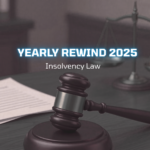Supreme Court clarifies the withdrawal process in BYJU’s insolvency

Introduction
In its recent ruling in GLAS Trust Company LLC v. BYJU Raveendran & Ors. (available here), the Supreme Court of India set aside the National Company Law Appellate Tribunal’s (NCLAT) decision in the insolvency case involving Think & Learn Pvt. Ltd., the parent company of ed-tech giant BYJU’s. The Supreme Court examined whether a corporate insolvency resolution process (CIRP) can be withdrawn through a private settlement between the corporate debtor and the creditor without complying with the procedural requirements outlined in the Insolvency and Bankruptcy Code, 2016 (Code). This ruling carries significant implications for creditors, debtors, and other stakeholders in corporate insolvency matters, emphasizing that the Code’s procedural framework must be upheld.
Facts of the case
The Board of Control for Cricket in India (BCCI) filed an insolvency application against Think & Learn Pvt. Ltd. (BYJU) before the National Company Law Tribunal (NCLT), claiming unpaid dues of INR 1.58 billion under a sponsorship agreement. The NCLT admitted the application and initiated the CIRP. However, before the Committee of Creditors (CoC) could be constituted, BYJU’s promoters negotiated a settlement with BCCI, bypassing the procedural requirements under Section 12A of the Code which provides that CIRP may be withdrawn with the NCLT’s approval, subject to 90% voting consent from the CoC.
As the CoC was yet to be constituted, BYJU approached the NCLAT challenging the NCLT’s order initiating CIRP. The NCLAT, invoking its inherent powers under Rule 11 of the NCLAT Rules, approved the settlement and set aside the NCLT’s order. This decision was challenged before the Supreme Court by GLAS Trust Company LLC, a financial creditor of BYJU’s, which argued that the settlement disregarded the rights of other creditors and violated the procedural safeguards of the Code.
Supreme Court’s ruling
The Supreme Court bench, examined two key issues:
- Right of the financial creditor to challenge the settlement: The Court held that financial creditors, even if not parties to a settlement, have the right to challenge such settlement. It emphasized that insolvency proceedings, once initiated, are “in rem” and impact all stakeholders.
- Invocation of inherent powers by NCLAT: The Court held that the NCLAT could not have bypassed the withdrawal process under Section 12A of the Code to direct withdrawal of CIRP on grounds of settlement. It clarified that inherent powers under Rule 11 cannot override statutory provisions designed to protect creditors’ collective rights. The court noted the Code mandates that the CoC must approve any withdrawal of CIRP, requiring a 90% voting share, reflecting the Code’s intent to prioritize collective decision-making. The Court reasoned that adherence to Section 12A avoids the risk of preferential settlements, which could unfairly prejudice other creditors.
The Supreme Court directed that the settlement amount paid by BYJU in an escrow account as part of the settlement to remain with the CoC, while it was open to BYJU to approach the now constituted CoC and seek withdrawal of CIRP under Section 12A of the Code.
Our Thoughts
The Supreme Court’s ruling, mandating that withdrawals of CIRP through settlements must strictly follow the process outlined in Section 12A of the Code highlights the importance of procedural compliance in achieving the Code’s objectives. This ensures the protection of creditors’ collective rights and prevents any stakeholder from bypassing the established framework. The judgment reaffirms that the Code is a self-contained and comprehensive statute, resistant to circumvention through inherent judicial powers of the NCLT or NCLAT.
This landmark decision is expected to shape the approach of tribunals and creditors in future insolvency proceedings. By prioritizing a transparent and equitable resolution process over individual settlements that may compromise collective rights, it promotes greater accountability in tribunal decisions and establishes a robust precedent for similar cases, reinforcing trust in the insolvency framework.
The information contained in this document is not legal advice or legal opinion. The contents recorded in the said document are for informational purposes only and should not be used for commercial purposes. Acuity Law LLP disclaims all liability to any person for any loss or damage caused by errors or omissions, whether arising from negligence, accident, or any other cause



